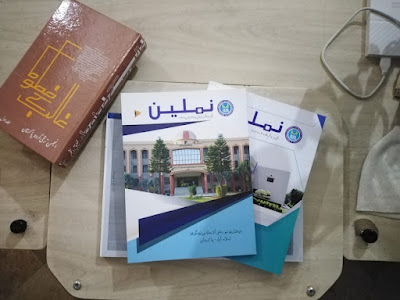'The Numlian' — A Rant
Recently, I received, as a gift, two issues of The Numlian, the creative outlet of NUML, one of Pakistan's leading public sector universities. As I browsed through it casually, I came across a response—no, a parody!—of T. S. Eliot's poem "The Hollow Men."
Before discussing what is wrong with that response, let me reproduce, for the reader, the words of the original bard:
The Hollow Men
Mistah Kurtz-he dead
A penny for the Old Guy
I
We are the hollow men
We are the stuffed men
Leaning together
Headpiece filled with straw. Alas!
Our dried voices, when
We whisper together
Are quiet and meaningless
As wind in dry grass
Or rats' feet over broken glass
In our dry cellar
Shape without form, shade without colour,
Paralysed force, gesture without motion;
Those who have crossed
With direct eyes, to death's other Kingdom
Remember us—if at all—not as lost
Violent souls, but only
As the hollow men
The stuffed men.
II
Eyes I dare not meet in dreams
In death's dream kingdom
These do not appear:
There, the eyes are
Sunlight on a broken column
There, is a tree swinging
And voices are
In the wind's singing
More distant and more solemn
Than a fading star.
Let me be no nearer
In death's dream kingdom
Let me also wear
Such deliberate disguises
Rat's coat, crowskin, crossed staves
In a field
Behaving as the wind behaves
No nearer—
Not that final meeting
In the twilight kingdom
III
This is the dead land
This is cactus land
Here the stone images
Are raised, here they receive
The supplication of a dead man's hand
Under the twinkle of a fading star.
Is it like this
In death's other kingdom
Waking alone
At the hour when we are
Trembling with tenderness
Lips that would kiss
Form prayers to broken stone.
IV
The eyes are not here
There are no eyes here
In this valley of dying stars
In this hollow valley
This broken jaw of our lost kingdoms
In this last of meeting places
We grope together
And avoid speech
Gathered on this beach of the tumid river
Sightless, unless
The eyes reappear
As the perpetual star
Multifoliate rose
Of death's twilight kingdom
The hope only
Of empty men.
V
Here we go round the prickly pear
Prickly pear prickly pear
Here we go round the prickly pear
At five o'clock in the morning.
Between the idea
And the reality
Between the motion
And the act
Falls the Shadow
For Thine is the Kingdom
Between the conception
And the creation
Between the emotion
And the response
Falls the Shadow
Life is very long
Between the desire
And the spasm
Between the potency
And the existence
Between the essence
And the descent
Falls the Shadow
For Thine is the Kingdom
For Thine is
Life is
For Thine is the
This is the way the world ends
This is the way the world ends
This is the way the world ends
Not with a bang but a whimper.
 |
| Source: Britannica |
Let us now look at the "response" uttered by our contemporary university poet (I have omitted the name on purpose, as I believe he may still, in the future, produce better work):
Modern Men
Modern Men are hollow men
Eliot says through mighty pen
Spiritless, Purposeless, Aimless, Plain
Modern Men are barren land
I do not see eye to eye
These are your thoughts not of mine
Let me show you modern men
Let me prove your thoughts in vain
Einstein, Neil Arm and Chomsky
Khomeini, Mandela, comrade Chee
Omidyar, Dell, Hope and Bill Gates
Poor Catches Success through these GATES
Edhi, Teresa, Pope John Paul
Work for HUMANITY is their Goal
Yes Eliot now what you say
Whose thoughts prove to be heap or hay
Here, dear friends, is what is wrong with this "poem":
- The author makes very obvious errors of syntax ("says through mighty pen" ... "now what you say" ...)
- The author very obviously tries to rhythm and rhyme in the beginning, then fails at is so miserably he gives up; the rhythm falls apart, even after breaking down people's names and English syntax to force fit the meter ("through mighty pen" ... "Neil Arm") and the rhyme ("comrade Chee" ... like, seriously?)
- The author did not engage with Eliot's critique, and this is glaringly obvious. Enraged, perhaps even for a reason, he goes out, eyes flaring, guns blazing, tauntingly declaring the fact that he does not see eye to eye (who are you, one may ask...) and somehow thinks his cute little list of names proves Eliot wrong. A second glance at the original poem, or even a singular first reading (and I can have my friend Zerak, who is untrained in literature and gave it just a layman's reading earlier, confirm this fact), shows that Eliot is engaging with an era, an overall atmosphere, a Weltanschauung (to make use of professorial language)—i.e. he is critiquing the shallow personhood that gives us such rubbish as TikTok and everyone being too full of himself. The author, however, seems to think that mentioning a bunch of names in a failed rhyme—i.e. a few, in a billion, driven people—somehow disproves Eliot's critique, while any careful reading would show that it actually proves what Eliot said!
- The author brings together such a random mishmash of names that he is able to mention Bill Gates and Che Guevara in the same rant! (I do not think I need to say anything else...)


Comments
Post a Comment